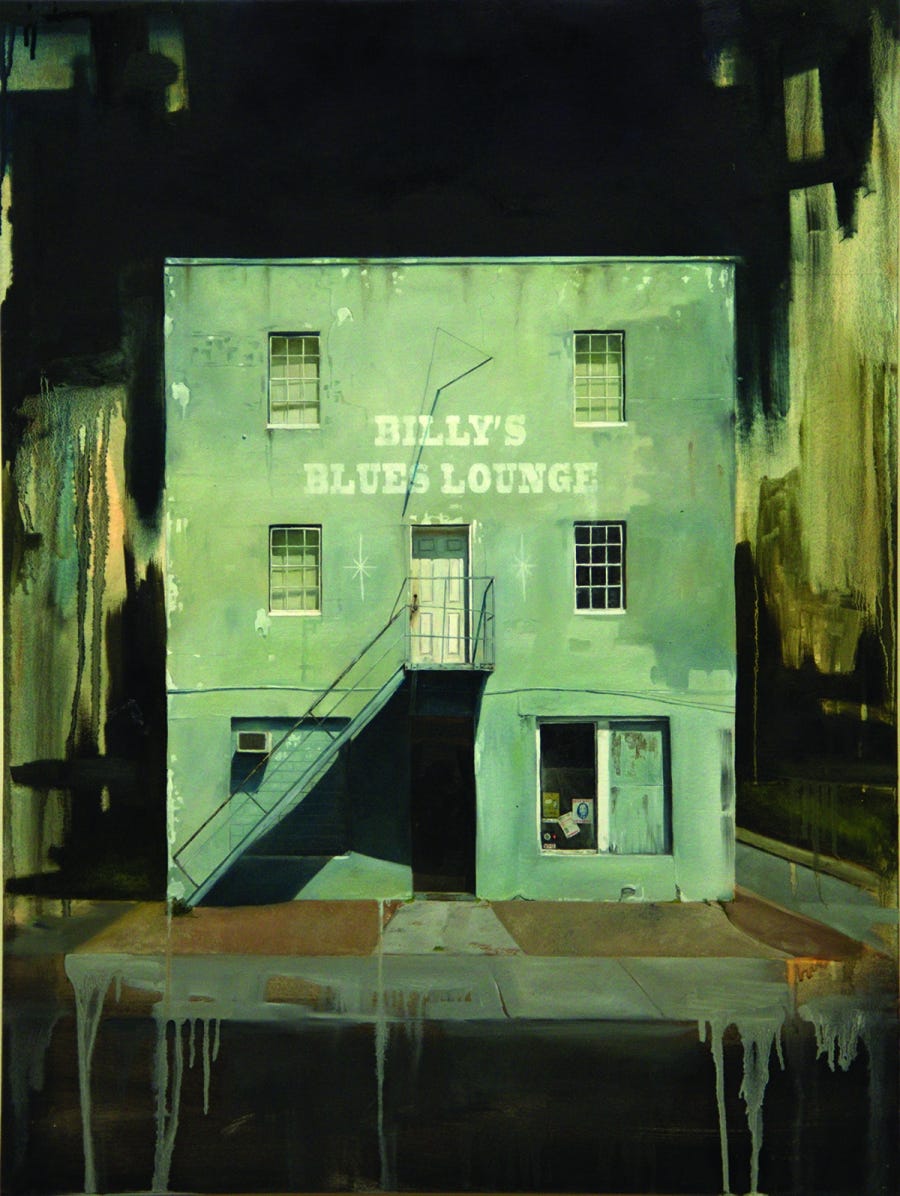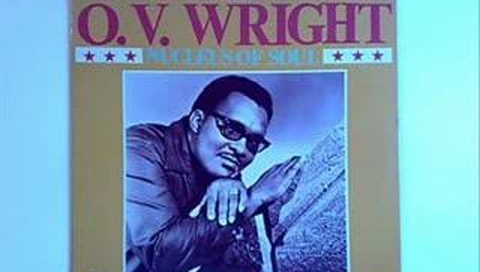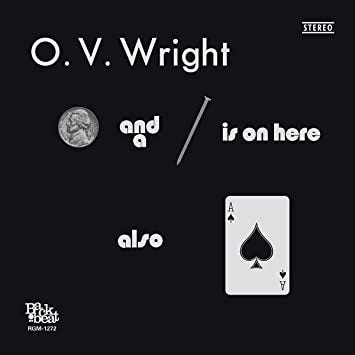Oh I once had love, and plenty of money
Willie Mitchell produced a string of classic soul records for Al Green — “Let’s Stay Together,” “Love And Happiness,” “Tired of Being Alone” — that made the former gospel singer he met as Albert Greene into one of popular music’s iconic voices. Mitchell turned Hi Records into a ‘70s southern soul hit factory with records by Ann Peebles, Otis Clay, and Syl Johnson, and he also made records with Hall of Famers Bobby “Blue” Bland and Ike & Tina Turner. But the greatest singer he ever worked with? Mitchell said that was O.V. Wright.
Overton Vertis Wright, too, was a gospel singer, joining The Sunset Travelers in 1956 while still in High School and later fronting The Harmony Echoes, The Spirit of Memphis, and The Highway Q.C.’s. Secular music beckoned, and Wright recorded “That’s How Strong My Love Is” for the Goldwax label in 1964 as O.V. Wright and the Keys. His original gospel recording contract with Peacock Records was still in force, however, and the song was re-routed to its R&B subsidiary, Back Beat. In that label shuffle, the single was more of a near miss than a hit. Otis Redding made it one the next year, and the ballad was covered in short order by The Rolling Stones and The Hollies.
Mitchell, meanwhile, had a crossover pop hit in ‘64 with the instrumental “20-75.” As the inhouse producer/musician/arranger, he was cranking out dance tracks at such a steady clip that the rumor was that Hi was an acronym for “Hit Instrumentals.” He was also leading bands for gigs from Beale Street to suburban country clubs as well as playing in small jazz combos. “I came up playing jazz; my chords were always different,” Mitchell said.1 “They got a little more melody or harmony but still had that laid-back rhythm underneath it.” His “Soul Serenade” was a #10 R&B and #23 pop hit and charted in the UK. When Hi founder Joe Cuoghi died in 1970, Mitchell took the reins of the label.
Wright had a few minor R&B hits with songs like “Eight Men, Four Women,” which was written with Peacock/Back Beat boss Don Robey. (Robey, it’s said, told Wright that he was too ugly to tour. This perhaps explains why Wright, who was no Sam Cooke but who in his thick glasses maybe was there to straighten out your taxes, struggled to break out of the mid-south.) The song is the kind of slow burner, more blues than rhythm, that relied heavily on the reservoir of ache in Wright’s voice. Mitchell heard a bit more, and he heard what was missing.
From Cooke and Green to Lou Rawls, you’d be hard pressed to find a significant soul singer of the ‘60s and ‘70s who didn’t start in gospel. Leaving gospel for popular music often meant leaving the sanctuary of the church; singing secular music was seen as a betrayal. Some bore that weight easier than others. Green returned to gospel by the end of the ‘70s, taking his injuries from falling off a stage in Cincinnati as a final sign from God. (The first was in 1974 when his ex-girlfriend threw a pot of scalding hot grits on him in the bathtub, then shot herself to death in the bedroom with his gun.) The pain that’s so present in Wright’s voice is certainly due to an ingrained rasp but also what feels like a gnawing need for absolution. He sings not like a man who’s lost a lover, but who’s lost his way.
Mitchell couldn’t bring Wright back into the church, but he did bring some church to Wright. Listen to their cover of Bob Dylan’s “Blowin’ In the Wind.” The song was the B-side to “Love The Way You Love,” which is a satisfyingly fat slab of southern soul spurred along by the fierce Memphis Horns (Wayne Jackson and Andrew Love). The Dylan cover, however, surrounds Wright with a choir; the song is played at a walking pace by a band that would fit behind a small-town pulpit. You still get the hurt in Wright’s voice — the man could sing a Mother’s day card and make it feel like the last act of Macbeth — but you also hear the soaring joy of a soul feeling its worth.
“Ace of Spades” followed in 1970, and it’s just electric. The tough midtempo groove is always tugging at the tempo to make it go a little faster, spurred along by Wright, who flexes that Redding and Wilson Pickett had nothing on him. As a producer, Willie Mitchell didn’t have a singular sound as much as a superlative band -- and an ear for what worked. The famed Hi Rhythm Section included the Hodges brothers (bassist Leroy, organist Charles and guitarist Mabon “Teenie” Hodges) and Stax drummer Al Jackson, Jr., “the human timekeeper.” The same group that created the sophisticated funk that helped put a Kennedy Center Honors rainbow around Al Green’s neck had no problem cranking through gritty funk to sell lyrics like “Listen to me baby, have no fear / The game you were playin' / I'm the one that brought it here.”
“A Nickel And A Nail” was released a year later, and part of what makes it such a marvel is that both Wright and the Hi Rhythm Section pack so much of what they could do into one song — the sensitivity and the power. A horn fanfare gives way to Jackson, who introduces Wright’s vocal with a snare roll, which isn’t to say we’re exactly prepared for it. At the end of the first line, Wright holds “love” a beat too long, bending it achingly upward. Just before the end of the first verse, the band is laying down a head-nodding groove as Wright stretches out “all I have” for a full five seconds, most of it spent making “all” into an invocation.
And every now and then I jingle, yes I do
Oh, they hear me jinglin´
Oh, they hear me jinglin´
With a nickel and a nail
That's all it is
I said all, all I have
Is a nickel and a nail
Now a nickel and a nail
Might save my pride, you see
But the need for your sweet loving
Oh baby, can't you see it's killin´ me
“When you gave O.V. Wright a song, the song belonged to him,” Willie Mitchell said2. He’s half right, because deep in Wright’s talent is an ability to give a song to you. When he sings about losing everything but five cents in his pocket, and a nail to make it sound like more, you feel all you could lose. You don’t have to know that Wright did lose everything not long after, doing a stretch in prison for narcotics and dying in the back of an ambulance in 1980. What Wright calls up in “A Nickel And A Nail” isn’t just there-but-for-the-grace-of-god-go-I heartbreak so much as a fierce desire to hug your children and make everything right with your partner. To listen to him is to be possessed by the same spirit. O.V. Wright was never not a gospel singer.
17 Song Playlist
“Nickel And A Nail” + Willie Mitchell instrumentals and a few choice cuts from the ‘70s Hi Records stable.
Read Bill Bentley
The great Bill Bentley’s piece in The Oxford American is way better than the one you just read. Trust.

Or Read Some More of Me
A second installment of Past Prime’s Prime vs. Past Prime feature: “Far From Over” (Frank Stallone) vs “All I’m Think’ About” (Bruce Springsteen). I worked up a sweat, literally. Feel free to examine these pieces for unresolved feelings from growing up in New Jersey. But please read Bill Bentley first.
Thank You
Thanks for your mashing of the “like” heart, which helps get this thing noticed, and sharing with friends. My body said “no” this week, so to those of you who expected to read something over a Thursday morning cup of coffee, an extra thank you for your patience.
https://memphismusichalloffame.com/inductee/williemitchell/
http://www.bluesandsoul.com/feature/492/bands_classic_interview_willie_mitchell/







"You still get the hurt in Wright’s voice — the man could sing a Mother’s day card and make it feel like the last act of Macbeth — but you also hear the soaring joy of a soul feeling its worth." Great writing! Are you still doing your writing somewhere, Scott?